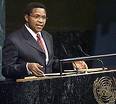
President of Russia, Vladimir Putin
Is there any real transparency in Africa, legion Transparency committees and Commissions of inquiry notwithstanding?
Russia's President Vladimir Putin has just finished answering live questions from a cross-section of the Russian public.They have been phoning-in and putting their questions to him. The whole thing has gone out live on two major TV channels in the country.
The questions ranged from policy implementation, environmental issues to motley of other issues that need clarification.
This, according to me, is a move that takes courage (and 'loads' of resilience!) and one that no one would attempt if they had anything to hide.
This has me thinking. Is it possible, even in the wildest of situations and imaginations, for our own leaders in Africa to even dream of adopting the Vladimir Putin system?
Methinks this system would save time, money and the citizenry would be better educated on what their government intends to implement and what it is doing on certain fronts, for instance.
Most countries in Africa are known for " unwarranted commissions of inquiry" to find out the "cause of a certain problem and know where to go from here". You should not even mention the "stacks" of dollars that go into these sittings. Incidentally, some of their findings are not made public, leaving questions lingering in the citizens' minds: did the commission pull through (or was there ever commission in the first place)?
We would like to ask our presidents some of these questions and hear them voice their concerns on the same.
"Why?" you may ask.
Well, most of the time we feel we need 'concrete' information (not the pursing of the lips that some of leaders treat us to) and a 'live' word from the president would allay some of our ingrained fears.
Our presidents and leaders have a lot to learn from Vladimir Putin.
My advice to them:
Clean your slate; pull yourself together; have nothing to hide; have a tight grip on the truth and have your people's interest at heart (not just 'lip service' kind of interest).
After all's been said and done, pick up that phone. With an air of confidence, call Vladimir Putin and ask him how the game goes.





